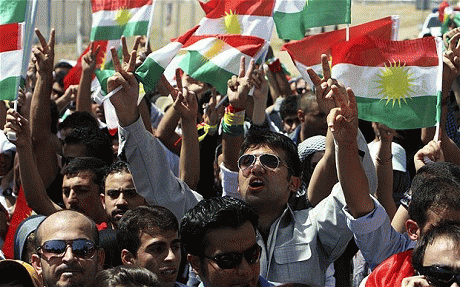Heavy fighting erupted Thursday between Iraqi government troops and Sunni militants who seized large parts of Fallujah and Ramadi, two cities in Iraq's western Anbar province that were at the center of the armed resistance to the US occupation a decade ago.
The renewed fighting came as figures released by the United Nations and other agencies indicated that the 2013 death toll in Iraq has risen to its highest level since the US military "surge" of 2007-2008.
The United Nations put the number of Iraqi civilian lives lost to violence last year at 7,818, with another 1,050 members of the security forces killed over the same period. Another estimate by the British-based group Iraq Body Count (IBC) put the civilian death toll at 9,475.
In releasing the UN's estimate, the head of the UN mission in Iraq, Nickolay Mladenov, said: "This is a sad and terrible record which confirms once again the urgent need for the Iraqi authorities to address the roots of violence to curb this infernal circle."
Noting that last year's death toll was roughly equivalent to that of 2008, Iraq Body Count pointed out that the 2008 figure "represented a decline in violent deaths (down from 25,800), whereas now it represents an increase; it has more than doubled since last year, when the recorded civilians deaths were 4,500."
IBC added that "If current violence levels continue unabated throughout the coming year, then 2014 threatens to be as deadly as 2004, which saw the two sieges of Fallujah [by the US military] and Iraq's insurgency take hold."
Click Here to Read Whole Article
The violence and fatalities have soared since last April, when the Shia-based government of Prime Minister Nouri al-Maliki ordered a violent crackdown on a Sunni protest camp erected in the northern town of Hawija, resulting in the deaths of roughly 50 civilians.
A similar crackdown on Monday against a protest encampment in Ramadi touched off the upheavals that left that city, Fallujah and several smaller towns largely in the hands of antigovernment insurgents.
In a crude attempt to defuse popular opposition, Maliki followed Monday's dispersal of the protest camp, in which at least 10 people were killed, with an apparent concession to one of the protesters' demands, announcing Tuesday that he was removing army troops from Sunni population centers in Anbar and leaving security to the regular police.
By Wednesday, however, heavily armed militants laid siege to police stations in Ramadi and Fallujah, releasing at least 100 prisoners, grabbing weapons stocks and burning a number of buildings. For the most part, the police abandoned their positions without putting up a fight.
Maliki then reversed his earlier decree and ordered the reinforcement of army units in the area, which prepared to lay siege to the towns, with artillery shelling parts of Fallujah by Thursday and air strikes reportedly carried out against both that city and Ramadi.
"Half of Fallujah is in the hands of ISIL [the Islamic State of Iraq and the Levant] and the other half is in the control" of armed tribesmen, an Interior Ministry official told the AFP news agency. He said that in Ramadi there was a similar situation, with some areas controlled by ISIL and others controlled by tribesmen.
AFP quoted one of its correspondents in Ramadi as saying he witnessed "dozens of trucks carrying heavily armed men driving in the city's east, playing songs praising ISIL" and carrying "black flags of a type frequently flown by ISIL."
ISIL, a Sunni Islamist militia movement linked to Al Qaeda, has become one of the main components of the "rebels" fighting in the Western-backed war for regime-change in neighboring Syria. Having seized control of territory in northern Syria, it has proven capable of moving forces back and forth across the Syrian-Iraqi border to stage car bombings, assaults on military and police units, and sectarian attacks. Its stated aim is the establishment of a Sunni Muslim caliphate spanning both countries.
Maliki had seized upon the actions of the ISIL forces as a pretext for violently suppressing the wider Sunni protest movement that has been provoked by the Baghdad government's sectarian bias, which has resulted in political marginalization and repression against the Sunni population.





